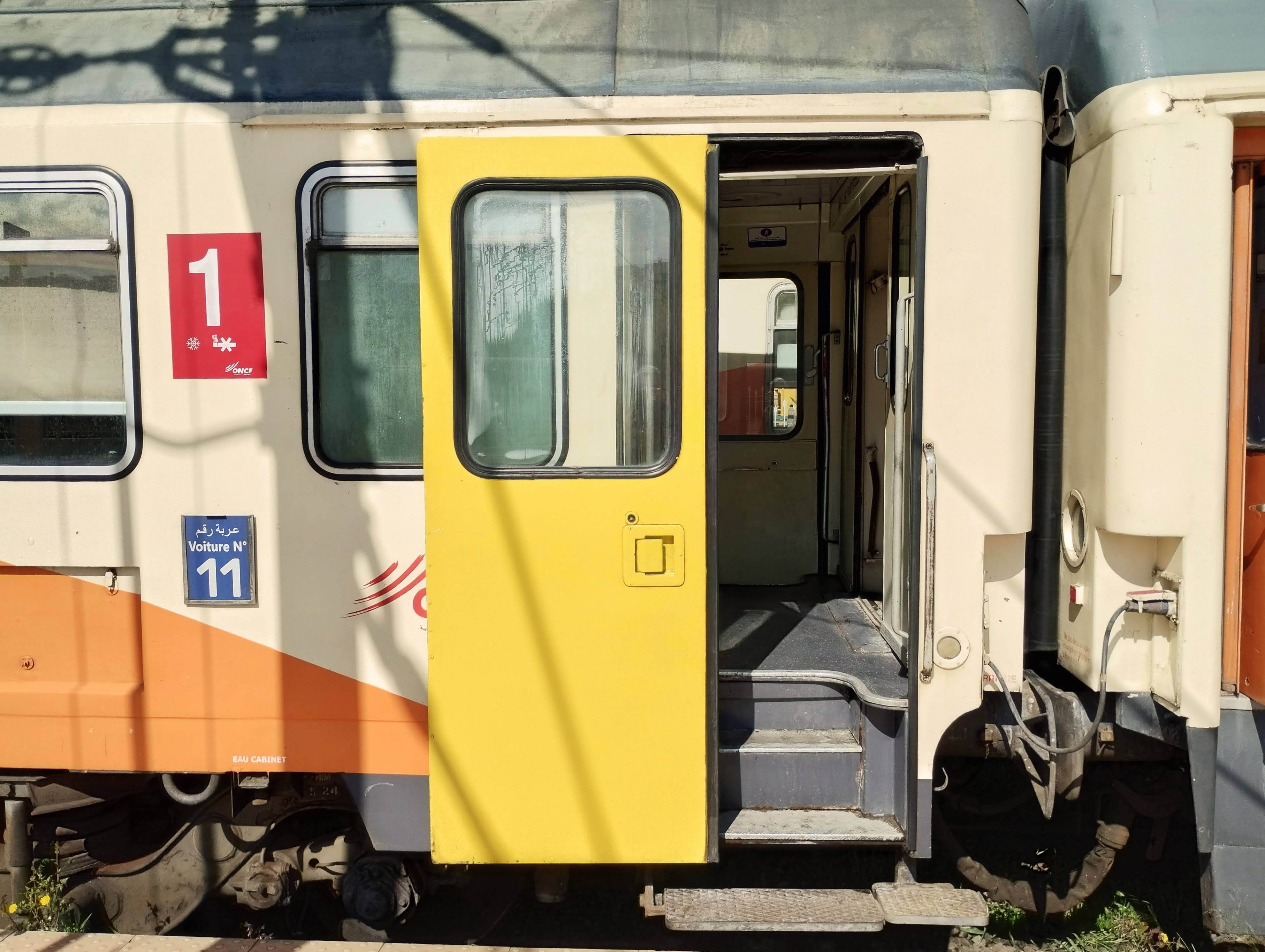Morocco, day ten: Casablanca
As trains go by.
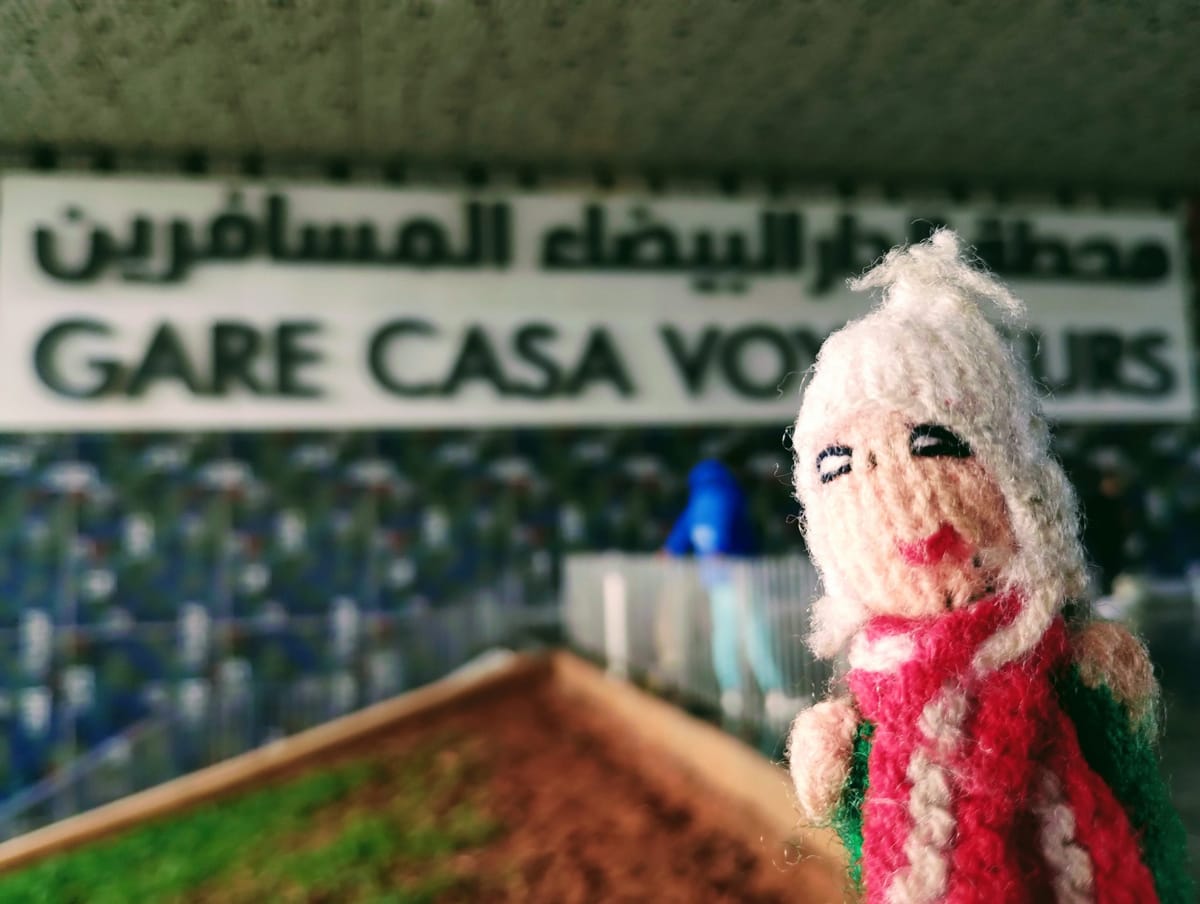
Friday's driver was unable to collect me today, so I was forced to venture bravely to hail a taxi by myself.
The day started with breakfast – as all days should – and going up to the roof from my room, I noticed there had been rain overnight and that Fès today was a little overcast. Still, this had no impact on the actual breakfast feast experience – which now included yoghurt – but I thought I'd mention it, in case I'm ever interrogated by meteorologists about my experience of Morocco.
I had until midday to check out, and took all the time I needed, thinking that I'd get a lift to the station from Friday's driver. He texted very early in the morning to cancel due to a family emergency, so I decided I would set forth in a taxi of my choosing without any assistance. It was a most exciting prospect, and to gird myself, I found a table on the terrace of a café next to the roundabout of last night. There, I nursed an espresso and a mint tea while drawing up a plan of action.
In retrospect it seems silly that a grown man should find taking a taxi such a challenging experience, but when tired and laden with baggage, it is quite daunting. Nonetheless, I was not to be deterred, and shortly after a quick-fire verbal altercation between my kindly waiter and one of his patrons – who'd taken it upon himself to suggest that he'd be my taxi – I chose a Dacia Sandero to my liking, agreed on a price of 20 dirhams, and braced myself for the drive to the station.
I didn't bother looking for a seat belt. Like Friday's drive, this journey was full of imaginative interpretations of lane discipline and traffic signals, but I was delivered to the station in one piece where, having got out of the taxi and hoisted my bag onto my back, I was immediately set upon by taxi drivers asking me if I needed a taxi.
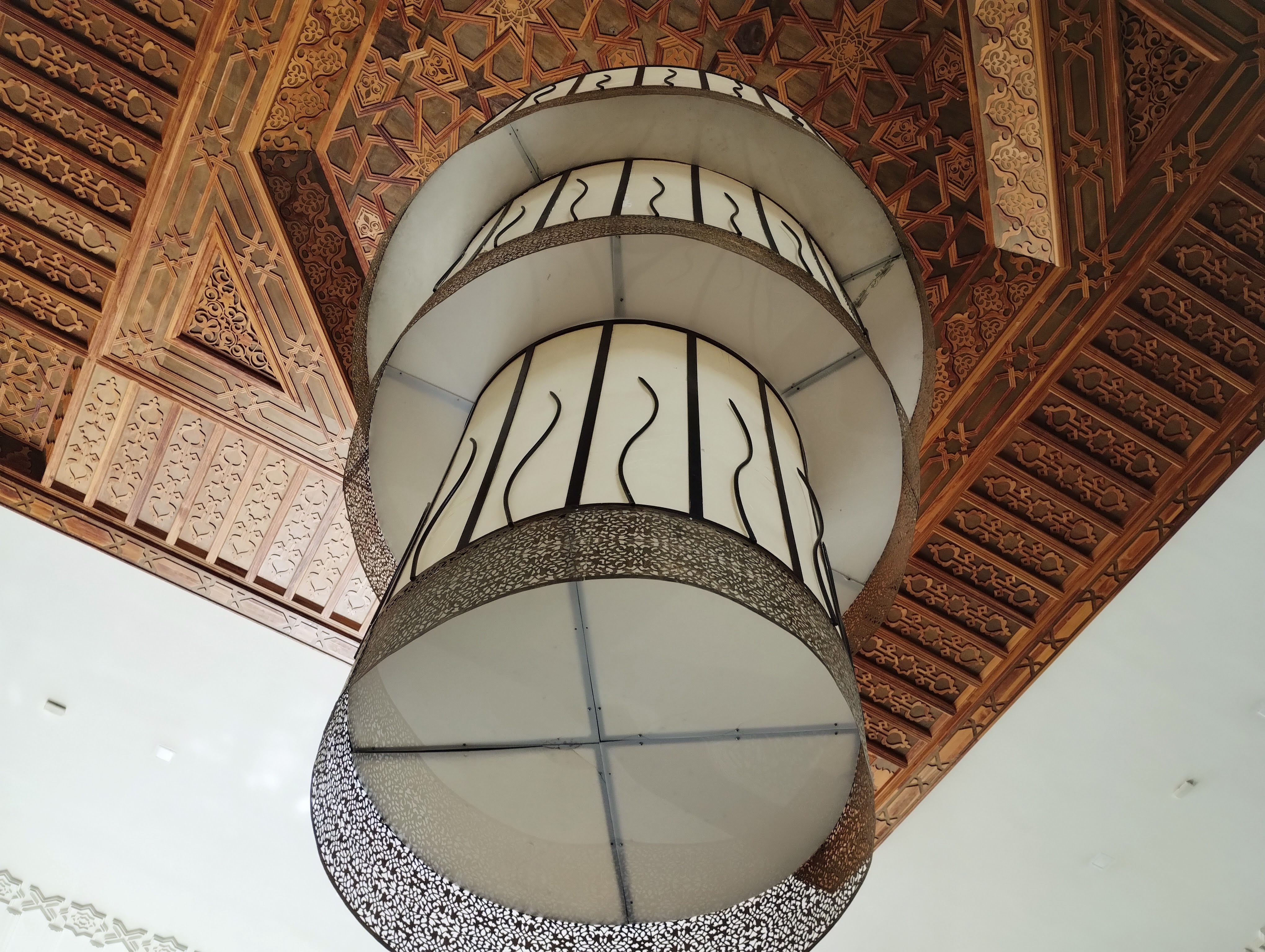
Fès station is woefully devoid of places to sit, and other travellers are also disinclined to move their bags while waiting for someone to return from some mythical errand, for which a seat had been reserved as reward. In the end I amused myself with a poke around the station, looking at things and marvelling at the audacity of the chandelier. Since my epiphanic experiences of Scandinavian stations with chandeliers during the last Interrail Extravaganza, I have been of the firm belief that railway stations need chandeliers.
Fès, however, is just showing off: the chandelier and ceiling carving seem to have come from somewhere much bigger.
We were told we'd need to be on the platform a few minutes before departure and this was sound advice, as it seemed that the walk to coach 11 at the front of the train took forever. Moroccan trains seem to be very long indeed. My comfy seat was a window seat in a compartment of six, and while my allocated seat was seat 86, in a moment of madness I took up residence in seat 85, as it was a window seat in the direction of travel. I also had the working part of the air conditioning, which was putting up a sterling effort given the train had been sitting in the pounding sun for all the time I'd been standing at the station.
For the first few stops I shared my compartment with a friendly woman, who explained over a date and a walnut that the main reason for all the chaos and building work in Fès is that it is one of six cities hosting the Africa Cup of Nations at the end of the year. We talked about my journey so far, and like Guide, she seemed perplexed that I should want to spend any time in Casablanca at all as – in her opinion – there are better places to visit. I explained I quite fancied seeing the massive mosque[tm] out of curiosity, and that there's also a cathedral which seems to be begging my attention.
But anyway.
We were joined in our compartment by a young man who spent quite a lot of the journey praying. Ordinarily, this might have been slightly alarming and unlikely to instill confidence in his fellow travellers, but he was later to be found solving the air conditioning problem, by opening one of the external doors as we charged through the countryside at around 120kph. Perhaps he’d just been asking for the courage to do that, as he was standing perilously close to the scenery as it thundered past.
The guard was not impressed.
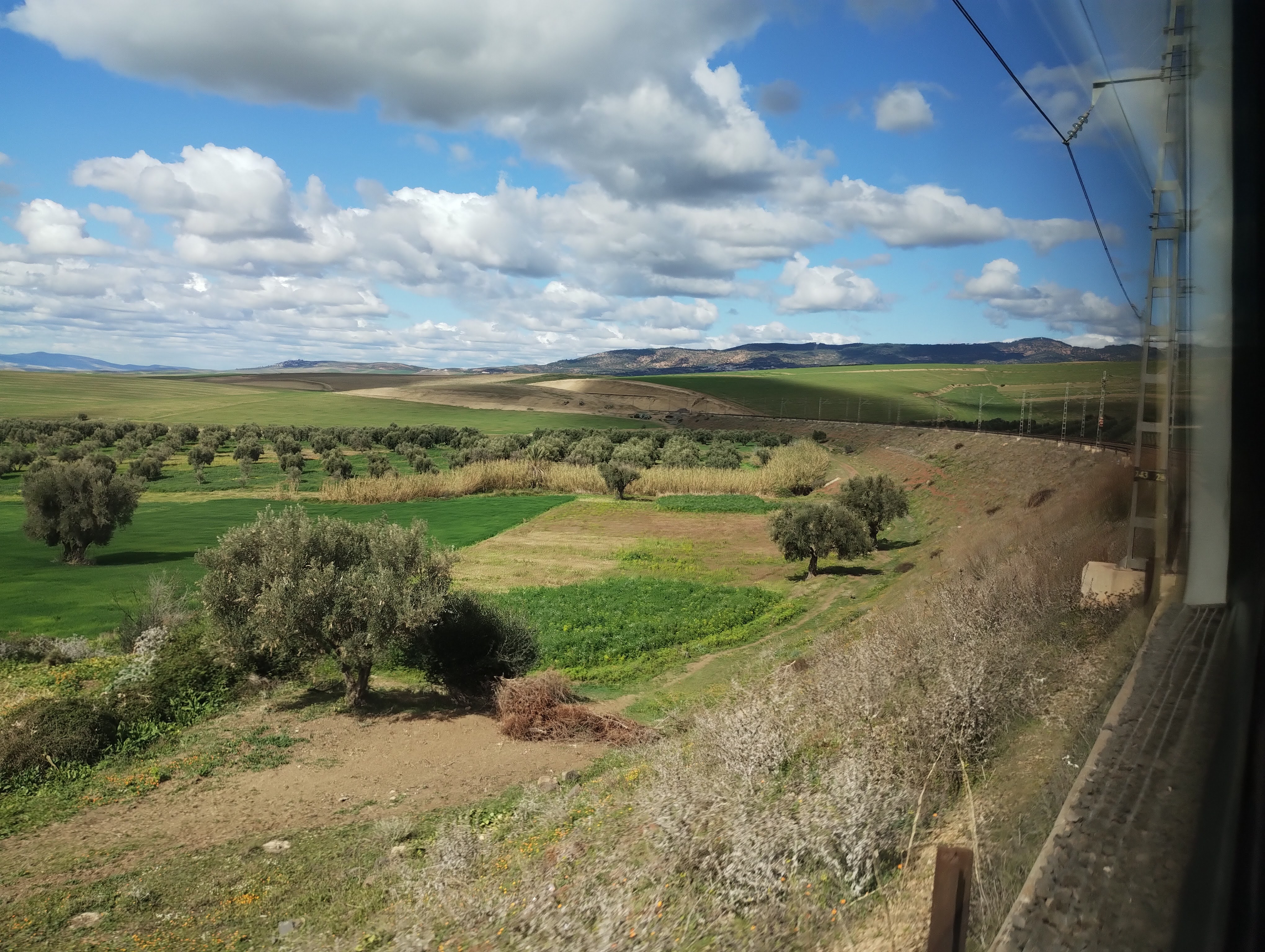
As our journey progressed, we were joined by three other people. The most tedious of these was a manspreader, who seemed to think the compartment his own private telephone booth. I took great pleasure in pushing back against the manspreading, but as nobody else looked inclined to raise the question of the phone calls, I turned my attention to the window and enjoyed the scenery instead. His tenure as compartment bore was mercifully short, and we were soon returned to tranquillity - until Rabat, where a girl entered the compartment and pointed in horror at the puppet-wielding gentlemen in her seat. She was reassured and convinced to sit in seat 86 by the nice lady bearing dates, who explained that I was perfectly normal.
I hope.
Moroccans driving machines seem to like using the horn. I noticed this as part of my taxi experience; so delighted they are to have one, they test it every now and then - to make sure it's still working. This allows them to tootle jaunty encouragement at the other traffic, while signalling to daredevil pedestrians that the horn works. The main tenets of the Green Crescent Code appear to be Pause, Look, Ignore, and Take your time.
The driver of the train also had a horn, which he was eager to use to show that he had a horn, and the guard was equipped with a whistle, which similarly demanded regular testing to show he’d been given a whistle. At a couple of stations along the route, there was a lot of angry horn blowing from the driver and whistle blowing from the guard, as people were encouraged to either get out of the way or get on the train while it was stationary, rather than waiting for it to start to leave the station before making the decision to board.
The rest of the journey passed peacefully and the scenery, once again, did not disappoint. As we headed west towards Casablanca, the weather seemed to soften a little, and soon we were travelling through lush green countryside and ever-present mountains on the horizon. I hastily booked a room for two nights at the Hotel Astrid, as my couch-surfing Student had apparently been out partying all weekend and was a little broken… and then sat back in my seat to enjoy the view.
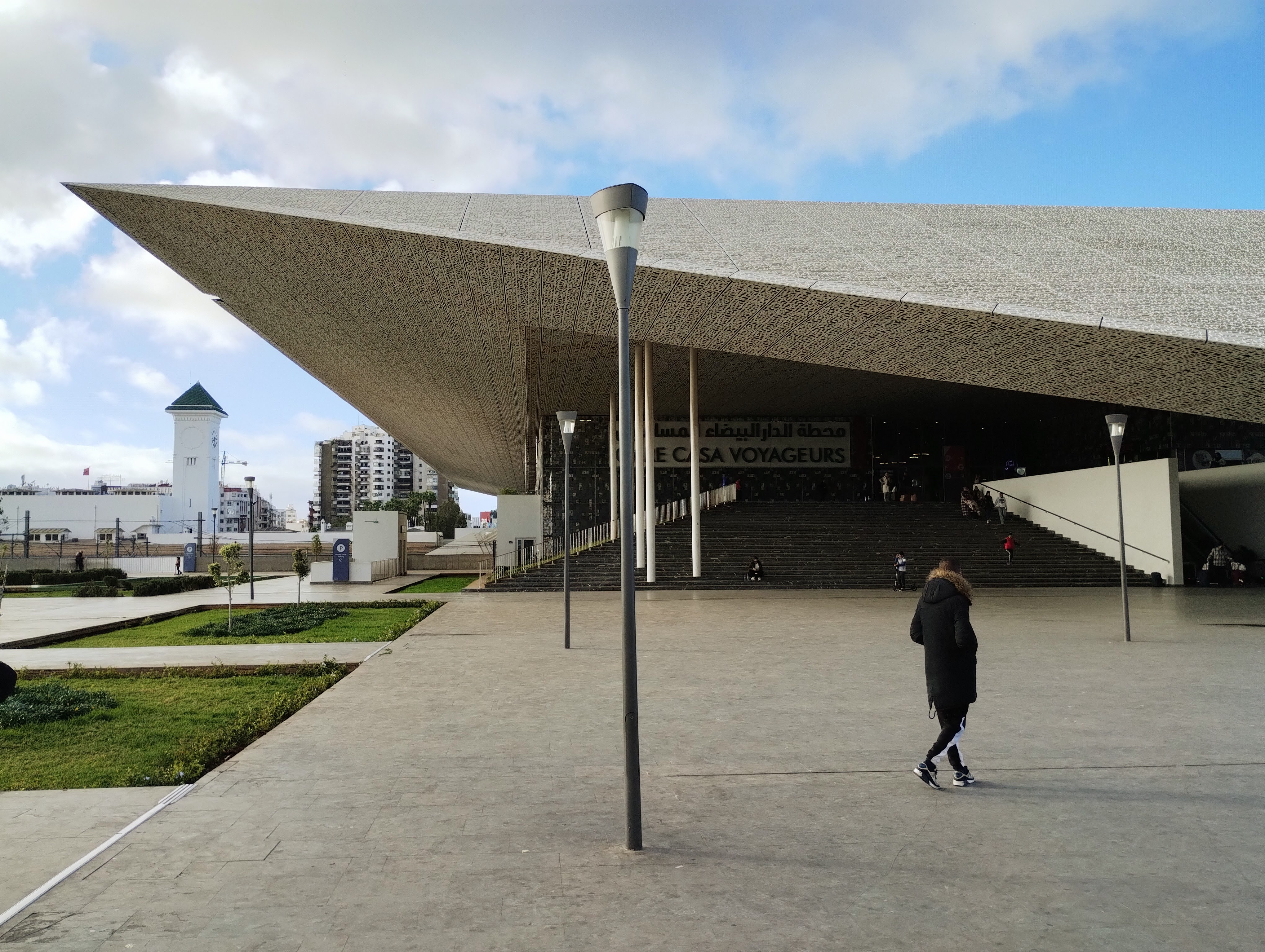
Casa Voyageurs is a hive of activity. Originally built in 1923, the old station was expanded in 2018 with a new pointy mega-structure to welcome the Al Boraq, for which it is currently the southern terminus. It is a bustling station, and the station concourse in the new part is full of shops and stalls screaming for the busy traveller's attention by pumping out thumpy music to the masses. In a way it feels quite familiar, with a McDonald's and a Starbucks, but once you get outside there's the immediate reminder that you need a taxi, and that Kansas this is not.
Emboldened by my morning taxi experience, I felt brave enough to take a tram one from the Place Sidi Mohamed to the Place des Nations Unies, then walk to my hotel on the rue du 6 novembre. The tram ride was fun, and this could have been any Mediterranean urban area, where the distinctive sound of an Alstom fake bell sample can be heard. Announcements were made in Arabic and French, and the tram was sparkly clean - so perhaps not a European tram after all. A contactless ticket from the machine cost me 8 dirhams, but I have yet to determine if I can recharge it.
Once I'd checked in and had a power nap, there was time in the evening for a walk around to find something to eat. Casablanca is Morocco’s economic capital, but this felt like the first place that neither my languages nor non-meaty preference were catered for. After some hunting, I eventually found a little snack bar, where I grabbed a cheese taco with chips and an apple juice for about a fiver, using a blend of broken Arabic and French.
Where there’s a will, there’s a way.
